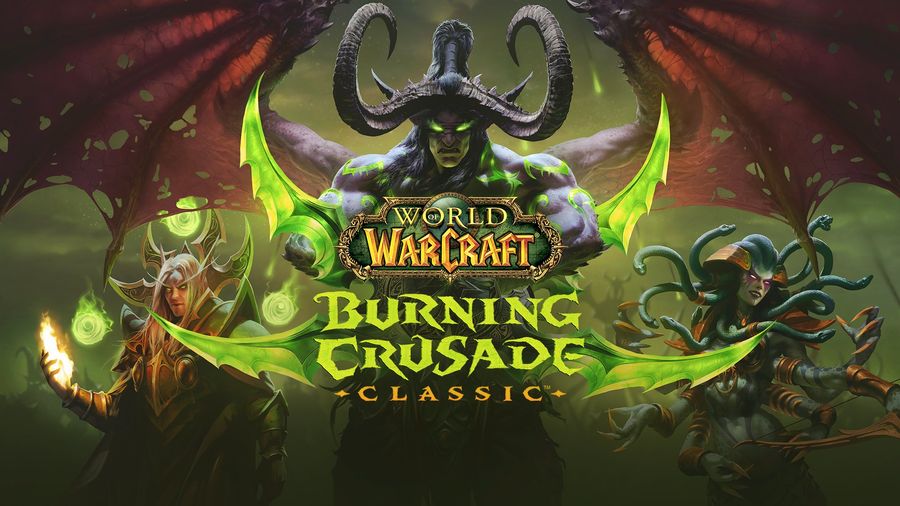If you follow this blog, even in a casual setting, you will know I have covered TBC classic extensively. My journey from 1-70 is well documented. I have done a write-up of every raid, covered the game's daily content, and even wrote a short "stuff you may have missed" segment.
So, knowing all of this, what is this blog post here for? Why now, so long after I stopped playing, and TBC classic passed into memory?
The short answer is closure.

TBC Classic was the last "big" thing I did before my first child. I put my life on hold for eighteen months to chase a dream, and to settle the nagging feelings in the back of my mind about what it would be like. To experience the content's nuances. Make my own tiny mark on a a much-celebrated cornerstone of video game history. To feel an emotional connection to a part of my formative years, and to see and feel the content for both the first, and last, time.
As I expected, TBC Classic is gone now. It has been replaced by WoTLK classic, which will in turn, be replaced, as early World of Warcraft expansions experience a second life in the hands of reimagined servers and new players. The window of opportunity to experience the game has well and truly closed.
All that remains is the memories. The written and visual accounts. The anecdotes, and the now-unused discords.
It wasn't a smooth ride. Early WoW being what it was, it was more like owning and operating a small volunteer organisation than playing a video game.
There was stress, rage - even tears, in the end. Over the course of my 18 month journey, I felt something almost indescribable - the thrill of adventure and the euphoria of hurling myself into the unknown. Yes, TBC was documented to death, but being at the coalface and seeing it for yourself, and growing with the game as it went through the motions - is something very special.
Would I do it again?
Absolutely.

Anyone will tell you that World of Warcraft has evolved with its audience. It is no longer the game it was in 2007. But it should not be that game. It should evolve in new and interesting directions, and its design and development teams have an obligation to both the players and shareholders, to continue to innovate and develop WoW.
But there's something about the rigid inflexibility of classic World of Warcraft that makes it more appealing than the modern iterations of the game.
Cool Ghosts co-host Matt Lees, in his review of remastered Final Fantasy XII, describes a concept known as "Worthy Work". The cliff's notes of this concept, is that working to achieve a goal is made satisfying as much by the struggle, as the reward. It's the video game boss you hated, the grind that bored you to death, the investment of time and energy you made, in pursuit of your goals, that makes them worthwhile.
Classic evokes that feeling of worthy work, in lots of little ways. To name a few, the now-retired concepts of attunement, unlocking heroic difficulty only after achieving a high reputation with the associated faction, and the reward of heroic difficulty still being incredibly challenging.
Even working as a team in PvP, or part of a dungeon and raid group, feels worthwhile and rewarding. The effort required to build a coherent, well-functioning team requires planning, game knowledge, and as many as twenty-four like-minded individuals.
Particularly playing on a small server like Remulos, where everyone knew everyone. It was like being part of a big extended family. You'd play with all sorts of kooky characters, from all walks of life.
And, like family, we fought like the devil. And we loved it. With cross-server play, automated queues and even cross-faction play now, you lose a certain amount of individuality, which makes the modern experience feel more isolated.
It's as much about the friends you meet along the way, as it is about the game itself.
This isn't to disparage modern WoW. Absolutely not - it's understandable that there have been changes made to the game after twenty years. In many ways, though, seeing the original mechanics of vanilla and TBC, you can see the game's flaws, as Blizzard's development and design team experiment.
There's a feeling of learning alongside the original developers, as you see the thought process behind certain mechanics and boss fights. How concepts like daily quests, reputational grind and the (at the time) brand new heroic dungeon difficulty were implemented. Like a ring-side seat to supervise Blizzard's laboratory.
There are experimental ideas - some good, and some bad - that you get to see in the heat of the moment. Some bosses needing a high amount of a specific resistance, to the point where you need to seek out alternative gear? That's in here. Needing a non-tank class, like a mage or warlock, to "tank" a boss? Up until phase five, that's a pretty common occurrence.

Classic WoW feels a lot closer to a role playing game through these and other little features. Tracking ammunition and pet happiness, reagents for spells, Shamans carrying totems - all of these things, in time, would be set by the wayside. Because they're not friendly mechanics. They don't serve a purpose. But it's the little belts of fat around the muscle of the game that add the most flavour.
Returning to that concept of worthy work. You hate them when they're here (particularly Hunters having to use steam tonk controllers). But when they're gone, you miss them. No matter how small they are. Because they made the game what it is.
Of course, towards the end of the expansion, when everyone was worn out, and tired, these things lost their luster, as they so often do. The euphoria of experiencing mechanics for the first time, or attending "new" raid content will eventually give way to the grim, monotone colour palette of micro-optimisation, correct gearing, theorycrafting, and counting numbers on a third-party website.
But even then, that's part of the journey.
I often found myself asking why I enjoyed TBC. And more generally, why I enjoyed World of Warcraft. The game's critics will call it a skinner box, designed to trap players and squeeze the life from them. And clearly that's true to an extent. But the other half of the game is its tremendous depth, afforded by the space in which it resides.

Much like more modern titles such as Dark Souls, WoW acquires additional depth as you play the game. Mechanically, it begins very narrowly in scope. Of course the narrative is big and broad, having a rich tapestry of three games to draw upon.
You learn about mechanics as you play through the game - it's drip fed to you in such a way (and, admittedly, deliberately slowly) in order to prevent you from becoming overloaded. You learn about the different ways your class functions at level 10. You learn about different types of gear when you can run instances at around level 15 - 20.
By the time you reach level 70, unless you hit your head, you'll should have a fair, but not perfect, understanding of your class, what gear to look out for, and a preference of specialisation. What you'll learn as you progress through the end-game are concepts like using macros, "customising" (i.e, ruining) your user interface with addons, and working together with a group.
That last part, in particular, is a big draw of WoW specifically for me. Yes, you can play the game out of the box. Even play well. But as a mechanical experience, WoW truly sparkles when you're trying to squeeze more performance out of your character.
Your keybinds are completely customised to suit your play. Your rotation is uncomplicated and enjoyable, because you made it that way.
You use macros, tiny scripts using a caveman version of LUA, to handle things like interrupting spellcasters. Every time you make a macro and it works exactly like you want it to, you get a cheeky dose of dopamine.
You move away from the traditional nameplates, and start using addons to give you more information in more ways about your targets. It's so much easier to see and do everything.
You start using weakauras, the final frontier. You have replaced your castbar and keybindings with an all-in-one solution that keeps you updated with all of your cooldowns. It's crystal clear at any point what you need to be doing, because you've taught yourself how to play to the best of your ability.
Does this all sound like a bit much for a make-believe game with trolls and elves in it? Sure. Is it super satisfying? Also, yes.
So whilst the title of this article implies that you'll be reading some sort of dated review of TBC Classic, this column will read more like a love letter for the game. And I don't apologise for that.

Because early world of warcraft is special because everything isn't in a neat, tidy package. There are bad mechanics, and things that will make you scratch your head. There will be boss fights that aren't fair, and sometimes, RNGesus will ruin an attempt. Or, in the case of the Eredar Twins, ten attempts.
In a direct comparison with retail World of Warcraft, it feels like retail World of Warcraft doesn't have the magic of earlier iterations of the game, because in learning the lessons of those expansions, there are no weird loose ends to tidy up. It's all muscle, and no fat.
Whereas classic World of Warcraft, even with its marginal adjustments, is a flawed product. But it is those flaws that make you appreciate your accomplishments more, and raises the game above the mean.
So, for the last time. Goodbye, TBC Classic. And thank you for the memories.

Catch you next time,
Vulkan
Critical Information Summary:
Review Platform: PC
Developer: Blizzard Entertainment
Publisher: Blizzard Entertainment
Cost (At Time of Publish): $20/Month (Ongoing Subscription)
Did you like this article? Did you hate it? Go over and keep the discussion going on the official Vulkan's Corner facebook page! - whilst you're at it, leave a like!

